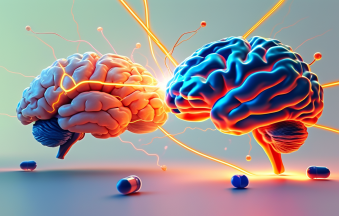Valerian Root vs. Melatonin: Which Sleep Aid is Right for You?
Sleeping well is important for maintaining one’s overall health and well-being. For those who suffer from insomnia or restless sleep, using natural sleep aids such as valerian root or melatonin is an option. While both are popular aids for sleep, their methods for improving sleep differ. In the following paragraphs, we will discuss the pros, cons, and effectiveness of valerian root and melatonin so that you can determine which option best fits your needs.
What is Valerian Root?
Valerian root comes from the herb of the valerian plant, Valeriana officinalis. It has been used for hundreds of years as a treatment for anxiety and sleep disorders. Some of the most active compounds found in valerian root are valerenic acid, which can encourage relaxation and soothing sedative effects on the nervous system.
Benefits of Valerian Root for Sleep
Improves Relaxation
Having a calm and quiet nervous system may help one to reduce anxiety, making it easier to sleep.
Improves Sleep Quality
Research indicates that valerian root increases the deep sleep stages, suggesting that one gets better sleep at night.
Non-Habit Forming
With appropriate use, valerian root does not create dependency problems as most sleep prescription drugs do.
Possible Negative Effects of Valerian Root
Most people will be able to use valerian root without any major issues, however, here are some reasons for concern:
- Drowsiness the next day
- Dizziness or headaches
- An upset stomach
- Interaction with other medications that one might already be taking
Understanding What Melatonin Is
Melatonin is a hormone secreted from the pineal gland situated in the brain. It aids in the sleep-wake cycle by activating in response to dark surroundings. Melatonin supplements are frequently taken for cases of sleeping disorders, usually in conjunction with jet lag, shifts in work hours, or disruptions to the circadian rhythm.
Benefits of Melatonin for Sleep
Regulates Sleep Cycles
Those suffering from sleeplessness due to an irregular schedule must have their body’s midnight internal clock reset by melatonin.
Helps with Jet Lag
Travelers can take melatonin to facilitate getting used to new time zones while minimizing jet lag symptoms.
Effective for Insomnia
Preliminary findings have discovered that melatonin is beneficial in aiding people who have difficulty sleeping.
Supports Shift Workers
Those suffering from working during the graveyard shift or having a rotating schedule are able to restore normalcy through melatonin intake.
Melatonin’s Side Effects List
Melatonin is considered a safe supplement for most people, but there are side effects for some which may include:
- Feeling sleepy or groggy the next day
- Headaches
- Nausea
- Hormonal changes with long-term use
- Disturbing vivid dreams or nightmares
Valerian Root Vs. Melatonin: Key Differences
When considering valerian root versus melatonin, one needs to consider the functions of both:
| Feature | Valerian Root | Melatonin |
|---|---|---|
| Source | Herbal Extract | Hormonal supplement |
| Primary Use | Anxiety relief, sleep aid | Sleep-wake cycle regulation |
| Best For | Stress-related insomnia | Circadian rhythm disruptions |
| Time to Work | May take days to weeks for full effect | Effective in 30-60 minutes |
| Side Effects | Mild drowsiness or upset stomach | Morning drowsiness and headaches |
| Habit Forming | No | No, but may develop tolerance with extended use |
| Common Dosage | 300-600mg before bed | 0.5-5mg before bed |
Which Option to Choose?
Choose Valerian Root If:
- You find it hard to sleep because of anxiety.
- You want a herbal solution that is less likely to be harmful.
- You would like to improve sleep in a non-hormonal way.
- You need a long-term plan for moderate sleep disorders.
Choose Melatonin If:
- You need aid in sleep induction due to an erratic sleeping schedule.
- You have to adjust to a different time zone.
- You want a quick-acting sleep aid.
- You experience sleep issues because of your work schedule or travel time differences.
Is It Safe to Combine Valerian Root and Melatonin?
Some may ask whether valerian root and melatonin can be used together to improve sleep. There seems to be no evidence for harmful interactions, but the combination may cause excess sleepiness. It is wise to discuss possible supplement interactions with a healthcare professional.
Other Natural Sleep Aids to Keep in Mind
If valerian root or melatonin do not work for you, there are other natural sleep aids that may help improve the quality of your sleep.
Magnesium
Makes it easier to relax tight muscles and promotes calmness.
Chamomile
A traditional herbal remedy with relatively weak sedative properties.
Lavender
Can lessen anxiety while promoting relaxation.
L-Theanine
An amino acid that promotes relaxation while not inducing sleep.
Better Sleep Lifestyle
Sleep aids are only part of the solution. Effective long-term sleep health requires better sleep hygiene. Try these ideas:
Be Consistent
Make a habit of sleeping and waking at the same time every day, including weekends.
Improve Relaxation and Sleep Rituals
Turn to restful activities such as reading, meditating, or taking a warm bath.
Limit Screen Time
Cut down on the use of gadgets and computers at least one hour before bedtime to avoid blue light exposure.
Avoid Caffeine and Alcohol
These substances can negatively affect your quality of sleep.
Exercise Regularly
Putting in some effort during the day can help make your nights more restful.
Final Thoughts
Valerian root and melatonin are different but equally effective natural sleep aids. Valerian root is perfect for those who suffer from insomnia due to anxiety, while melatonin is a sleep cycle regulator. Knowing this will enable you to make a choice that allows you to sleep better.
If you are always having issues with sleep, maybe it’s time you looked into getting professional help. Have you used valerian root or melatonin? Let us know in the comments.














Add comment